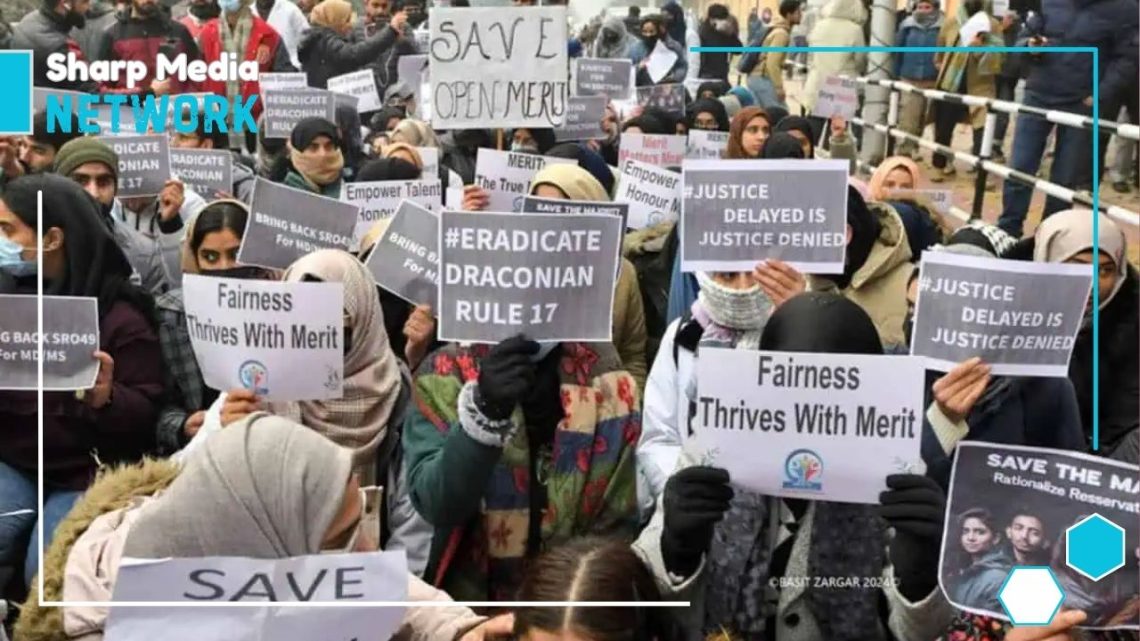
Protests Erupt Over Reservation Policy Changes in IIOJK
January 23, 2025 Off By Sharp MediaThe recent amendments to the reservation policy in IIOJK have ignited widespread protests, sparking debates over meritocracy, fairness, and political motives behind the changes.
In the Indian Illegally Occupied Jammu and Kashmir (IIOJK), recent amendments to the reservation policy have led to significant protests and growing concerns among various communities. The most notable change is the reduction of open merit (general category) seats from 57% to 33%, while the reservation for Scheduled Tribes (ST) has been increased from 10% to 20%. These changes have triggered debates over fairness, meritocracy, and the potential political motivations behind the adjustments.
One of the most controversial aspects of the new policy is the concept of “dual eligibility.” Reserved category candidates are now allowed to compete for both reserved and open merit seats. However, if a candidate secures an open merit seat and later upgrades to a reserved category seat, the open merit seat vacated is transferred back to the reserved pool, rather than remaining in the open merit category. This rule, known as Rule-17, is unique to IIOJK and has been criticized for disadvantaging general category candidates, raising questions about the fairness of the system.
Critics argue that the reduction in open merit seats undermines the fundamental principle of merit-based selection, potentially compromising the quality and competence in key sectors such as education, employment, and government services. The policy is perceived as disproportionately benefiting the reserved categories, leading to fears of exclusion among general category candidates. This shift, many believe, might further diminish the opportunities available to non-reserved communities, thus raising concerns over its long-term implications for the region’s development.
The policy changes have sparked widespread social unrest, with protests organized by groups such as the Open Merit Students Association (OMSA), which has been supported by political leaders. These protests reflect the growing frustration among communities who feel marginalized by the new reservation system. Political leaders from various factions have rallied behind the general category candidates, demanding a review of the policy to ensure more equitable representation across all communities.
Key demands from the protesters include a comprehensive review of the reservation policy, particularly the controversial Rule-17. There is a call for the immediate abolition of this rule to prevent reserved category candidates from occupying both reserved and open merit seats, which protesters argue creates an unfair advantage. Additionally, there are calls for the implementation of more transparent and equitable policies that balance affirmative action with merit-based opportunities, ensuring that no community feels excluded or alienated.
Many critics suggest that the policy amendments may be politically motivated, designed to consolidate the support of specific groups ahead of elections. This theory has gained traction given the sensitive political context in IIOJK, especially after the abrogation of Article 370 in 2019. Some political commentators argue that the reservation changes align with broader electoral strategies to influence voter dynamics in the region, possibly reshaping the socio-political landscape to favor certain communities.
The ongoing protests and accusations of favoritism reflect deepening divisions in IIOJK, with some communities fearing that these policy changes are part of a larger effort to alter the region’s demographic and political structure. The situation underscores the delicate balance that must be struck between promoting social justice and ensuring merit-based opportunities, ensuring that all communities—whether in the reserved or open merit categories—have access to fair and equal opportunities.
As the situation unfolds, it’s clear that a more balanced approach is needed, one that promotes fairness and inclusivity without compromising the principles of meritocracy. If the reservation policy is to serve the best interests of all communities, it must be carefully reviewed and reformed in a manner that fosters unity rather than division.

